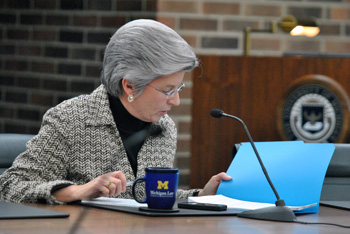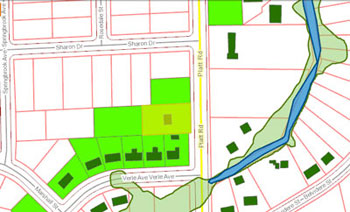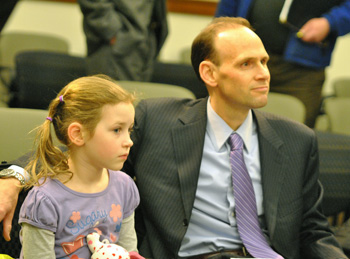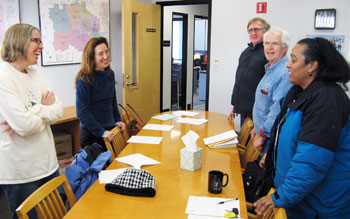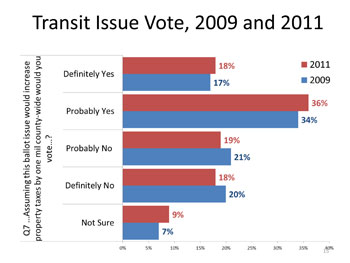Ann Arbor city council working session (Feb. 13, 2012): At a working session last Monday, the council took its first look at the budget for fiscal year 2013, which starts July 1, 2012. Continued from a budget committee meeting on Dec. 12, 2011 was the theme that this year is the second year of a two-year planning cycle – and the city financial staff are approaching it that way.
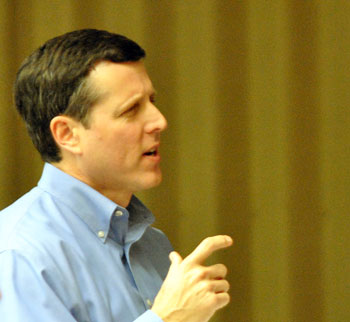
City of Ann Arbor chief financial officer Tom Crawford before the Feb. 13, 2012 working session. (Photos by the writer.)
With the exception of one significant change – adding one police officer instead of cutting nine – the blueprint for this year’s budget will, with some slight revisions, follow the plan put in place last year. That includes a plan to eliminate five firefighter positions, pending labor negotiations with the firefighters union.
At the December budget committee meeting, city administrator Steve Powers described this year as taking a “breather” – while stressing that the review of the organization is an ongoing process.
The relative luxury of essentially following the second year of a two-year plan is made possible this year by positive news and outcomes on several fronts.
But at Monday’s working session, the city’s chief financial officer, Tom Crawford, urged a cautious approach, given pending uncertainties about the basic structure of funding local governments in Michigan. Among those uncertainties is the future of the personal property tax, which could drop the city’s general fund revenue by $1.76 million, if that tax were to disappear completely. He advised the council not to use one-time positive outcomes to increase expenditures. Instead, he recommended that the city should strive to increase its fund balance reserve to 15-20% of expenditures – it currently stands around 13%, or $10.5 million. The general fund budget for the city this year calls for $78,321,015 in expenditures.
One of those positive outcomes is the retiree health care funding level for FY 2013, recommended by the city’s actuary – $12.4 million. The city’s planned cost for FY 2013 was $15.3 million. But Crawford is recommending that all but $400,000 of that $2.9 million savings should continue to be paid into the city’s voluntary employees beneficiary association (VEBA), to reduce unfunded liabilities and to guard against future liabilities. The potential $2.9 million savings is a citywide figure.
But as a result of another VEBA-related policy choice that Crawford is recommending, the city’s general fund – out of which basic services like police, fire, planning, and the like are paid – would see a roughly $1 million boost. That policy change would start treating retiree health care as a true pre-funded system, instead of the current pay-as-you-go hybrid. The current hybrid pay-as-you-go approach places a higher burden on those funds that have a relatively large number of associated retirees – workers who were paid out of that fund while they worked for the city. [As of December 2011, the city's general fund had 366 active employees and 532 retirees.] Crawford’s recommended approach focuses on the gaps in pre-funding, which puts the financial burden where most of the liability is currently accruing – active employees. And that would translate to a $1 million general fund savings, compared to the current approach.
Crawford put specific pieces of positive budget news in the context of general positive news, suggesting that the city has now seen the worst of the 2008 economic downturn. Unemployment numbers are dropping – in the Ann Arbor area, unemployment stood at 5.5% in December. And state sales tax receipts are coming off depressed levels – that’s important, because the “revenue” in state shared revenue (the amount the state distributes to local units of government) comes from state sales tax receipts.
Among the specific pieces of positive news Crawford presented to the council was the expectation that the city would break even on the current budget year (FY 2012), which ends June 30, 2012. The city had expected to tap the general fund reserve for $1.1 million this year. In the previous year (FY 2011), the city also essentially broke even, when it had anticipated needing to spend $1.5 million from its fund balance reserve.
Compared to what was anticipated in the two-year plan for FY 2013, on the revenue side several categories are expected to increase. Additional expenses, compared to the two-year plan, include adding a police officer instead of eliminating nine positions.
The net effect of all the changes from the two-year plan is a $1.6 million surplus of recurring revenues against recurring expenses for FY 2013. Of that surplus, Crawford is recommending that the council allocate $150,000 for a pilot program for recruiting police officers. But the rest he’s advising the council to add to the fund balance reserve to guard against leaner years projected in FY 2015-16.
The police recruitment program would allow potential hires to work under the direction of an Ann Arbor police officer before being hired on as a sworn officer. The program’s rationale was described by police chief Barnett Jones at the Feb. 13 working session as stemming from the hiring process to fill nine officer positions that came open at the end of 2011, due to retirements.
Jones gave a presentation of year-end crime reports showing that crime in major categories is trending down for Ann Arbor. Despite the net gain of 10 officers now anticipated for FY 2013, compared to the AAPD staffing levels in the two-year plan, the department’s 118 sworn officers leave Jones 32 short of the 150 that he described at the working session as the “perfect” number of officers for Ann Arbor.
After the jump, this article includes charts and graphs of crime reports, more detail on the impact of retiree health care on the budget, the budget outlook for FY 2013, and the city council’s work schedule for ratifying the FY 2013 in late May. [Full Story]





